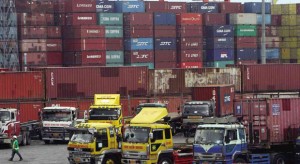Government officials on Tuesday stood firmly by the decision of the city government of Manila to implement the new truck ban policy, noting that complaining stakeholders should instead adjust their operations.
This was despite the repeated calls by local and foreign business groups to lift the policy, which was seen to have severe repercussions on businesses, export revenue growth and job generation.
Public Works Secretary Rogelio Singson noted that the evening operating hours were not being optimized, which meant either the trucks, the container yards or warehouses that receive the imported goods were not operating fully during that window.
“The window should be sufficient. Unfortunately, we still need to get all the stakeholders like the port operators, the Philippine Port Authority, container yards to cooperate in the sense that they should be open in the evening during (the window),” Singson explained at an economic briefing yesterday.
“We are still discussing (issues) with other stakeholders. But this also forces the overall policy direction that we should decongest the Port of Manila and let them operate in Batangas and Subic. Some are now forced to use Batangas and Subic ports. We will continue to dialogue with stakeholders to address the truck operating hours but we need the cooperation of all stakeholders,” Singson pointed out.
The new policy in Manila bans eight wheelers and vehicles with a gross weight of above 4,500 kilos from plying Manila’s streets between 5 a.m. and 9 p.m. A temporary concession was offered by the city government allowing trucks to ply the streets between 10 a.m. and 5 p.m. during the next six to eight months.
“We now have to (convince locators) to use the Batangas port, especially because most of the manufacturing facilities are in Batangas. Some have shifted to that port already by necessity. It’s a good thing, too, that the Department of Transportation and Communications is talking to shipping lines to call port there,” noted Lilia de Lima, director general of the Philippine Economic Zone Authority (Peza).
“There are short-, mid- and long-term options that can only be implemented at an inclusive roundtable involving also the national and local governments and the port operators,” Martial Beck, vice president of the European Chamber of Commerce of the Philippines (ECCP), told the Inquirer.
“While Manila remains the main port and we work on increasing cargo volumes through Subic and Batangas, access to Manila port must (still) be improved via a connecting road linking to the Skyway that is being built to link the South Luzon Expressway and the North Luzon Expressway,” he added.
The ECCP, Peza, Federation of Philippines Industries (FPI), the Semiconductor and Electronics Industries in the Philippines Inc. (Seipi) and the German-Philippine Chamber of Commerce and Industry (GPCCI) were among those that warned the government that the expanded daytime truck ban being implemented in Manila would only cripple businesses and likely result in a cut in the growth of exports and production, job losses and potential company closures should the scheme be continued.
